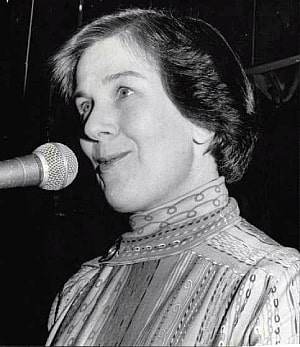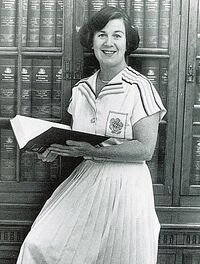Maighread Caitlin Arascain
Maighread Caitlin Arascain | |
|---|---|
 Maighread Caitlin Arascain in 1978 | |
| Minister of Social Security | |
| In office 6 June 1983 – 3 June 1991 | |
| Chancellor | Lars af Vellarand |
| Member of the Chamber of Representatives | |
| In office 1975–1994 | |
| Constituency | Vassengård-South |
| State Treasurer of Vassengård | |
| In office 1960–1975 | |
| Governor | Gunter Frølund |
| Member of the Vassengård State Parliament | |
| In office 1960–1975 | |
| Constituency | Tordenhelm County |
| Personal details | |
| Born | 15 May 1925 Fargir, Cybria, Delkora |
| Died | 12 December 2020 (aged 95) Delkora |
| Nationality | Delkoran |
| Political party | Conservative (1950s–1992) Centre Democrats (1992–2003) Conservative (2003–2020) |
| Alma mater | University of Vassengård |
| Occupation | Accountant |
Maighread Caitlin Arascain (15 May 1925 – 12 December 2020) was a Delkoran politician who served as Vassengård's state treasurer in the government of Gunter Frølund, from 1960 to 1975, and as the federal Minister of Social Security in the Lars af Vellarand government, from 1983 to 1991.
She was a prominent New Conservative and a powerful member of the "Vassengård faction", whose federal career was dominated by battles with the national conservative and neoliberal factions of the party.
Early life
Maighread Caitlin Arascain was born on 15 May 1925, in Fargir, Schottian-majority village on the island of Jårnland in Cybria. She was the second of three children; her father was a postal worker and her mother was a schoolteacher.
Her father died when she was 10, and her mother raised the children alone. She later commented that her mother's experiences led her to realise "that, at any time, a woman must be capable of independence."
The family moved to Vassengård in the 1930s, settling in Tordenhelm. She attended state school until the age of 16. She then took work as a secretary and attended night classes, studying accountancy at the University of Vassengård. She qualified as an accountant and a chartered secretary, going into private practice so as to spend more time with her family.
State politics
Arascain joined the Conservative Party in the early 1950s. She was mentored by Gunter Frølund and Bendte Frølund, who encouraged her to seek leadership positions within the party. She was the elected chair of the state party's women's wing in 1958, a position which helped raise her profile as a young reformist figure.
She resigned the post in 1960 in order to run in that year's state election, successfully.
Frølund appointed Arascain to the finance portfolio of his state government. At 35 years of age, she was the youngest and first female treasurer of Vassengård. Ideologically, she was a paternalistic conservative, and summarised her program as "government can be progressive and solvent at the same time". Her social liberalism and fiscal conservatism fit perfectly with Frølund's own priorities, and she became one of his vital allies in government.
During her 15-year tenure, Arascain increased spending on public services, increased salaries for teachers and doctors in the public sector, reformed the mental health system, and greatly expanded public housing and infrastructure. At the same time, she maintained modest surpluses and reduced the state's debt by over ⊻100 million.
She was friendly to the private sector, establishing a state agency to help small businesses, but also practiced aggressive economic interventionism at times, nationalising several strategically important sectors and expanding state enterprises.
Arascain's pragmatic interventionism earned the scorn of the Conservatives' right-wing faction, but conversely the respect of National Labor. This set a pattern for Frølund's government, who often cooperated with the opposition National Labor and relied on their support to pass legislation, even after the progressive conservatives achieved dominance in the state party.
For most of the New Kingdom era, Arascain was the only Conservative state treasurer in Delkora, recognised for her moderate image and thick Schottian accent. When participating in international meetings, she agreed to use the Anglicised form of her name, Margaret Kathleen Erskine, to accommodate foreign dignitaries. She was a supporter of the New Kingdom program and developed good relations with the federal government, particularly with finance minister Harald Henriksen.
During the 1968 protests, Gunter sent her and Bendte to meet with striking workers supported by LO president Mireli Sørensen, and she succeeded in securing a deal that was accepted by both unions and government.
Federal politics
Arascain's New Conservative faction fought its way to a leading role in the federal Conservative Party during the 1970s, and she followed the Frølund family into federal politics. In the 1975 federal election, Bendte led the party into a second place finish, becoming the official opposition for the first time since the 1950s depression. Arascain won election to the Chamber of Representatives, and resigned as state treasurer.
In Parliament, Arascain served on the Standing Committee for Finance. She took pains to avoid being pigeonholed as a spokesperson for women, and won acclaim for her diligence and attention to detail. She contributed to several minority reports that advocated tax reform, particularly closing loopholes for the rich and ending corporate welfare.
The party's growing popularity in this period, and the possibility of it returning to government after two decades of wilderness, deepened factional battles. Arascain was one of the foremost representatives of the New Conservative faction, together with Bendte Frølund and Phaedra Thorup, and this brought the hostility of the Heritage Faction and Liberty Conference. She reciprocated, attacking the party's intake of "young, braying jackasses" like Ulrik Andersen, and noted that "there was an undeniable misogynist element" to the attacks leveled against her, Frølund, and Thorup.
Following the Conservative victory of 1983, Lars af Vellarand appointed Arascain minister of social security. She was one of the few New Conservative ministers in the cabinet, and protested about the way Thorup had been snubbed and denied a cabinet role. In the social security portfolio, Arascain was seen as skilful in balancing political and financial considerations. She strongly resisted pressure to cut her department's budget, arguing that regular increases were needed simply to maintain existing programs.
Arascain strongly pushed for increases in social security spending, and oversaw a major reform of child benefit programs, introducing or expanding funding for preschool, daycare, after-school care, and youth refuges. She strongly resisted calls to introduce means-testing. Her stance made her popular among the public, but also somewhat isolated in a cabinet dominated by the Heritage Faction and Liberty Conference.
She had a hostile relationship with the finance minister, who complained to Vellarand she was the most uncooperative minister regarding spending cuts, and with Andersen, whose pension cuts she publicly opposed. Vellarand often contemplated sacking Arascain from the cabinet, but concluded the resulting public uproar would be more damaging.
After the Conservatives narrowly won re-election in 1991, Arascain was sacked from the cabinet by her old foe Andersen, now Chancellor. She told the media she wasn't surprised at her firing but criticised the "pointless cruelty" with which it had been announced.
She strongly criticised Andersen's actions during the Siege of Gothendral, and supported parliamentary inquiries that revealed scandals ranging from the neoliberal conspiracy to electoral fraud. Disgusted, she was one of the first Conservative legislators to defect to the Centre Democrats in 1992.
Later life and death
Arascain retired from Parliament in 1994. She enjoyed a good relationship with Chancellor Emma Jørgensen, who respected her record in public life and occasionally sought her advice on dealing with the Centre Democrats.
She was nominated for a post at the Federal Budget Office from 1994 to 1998, where she helped overhaul its accounting procedures. She also campaigned for more nominations for women in the Delkoran honours system.
She remained involved with the Centre Democrats after leaving Parliament, and played a key role in the party rejoining the Conservatives after they had undergone their own internal reforms. She chaired an internal party commission to encourage recruitment of women as Conservative candidates, and contributed to the party's manifestos of 2006 and 2010, which bore the imprint of her New Conservative faction.
She died on 12 December 2020 of natural causes.
Private life
She married a fellow accountant in 1952, a marriage that lasted until her death, and had three children.
